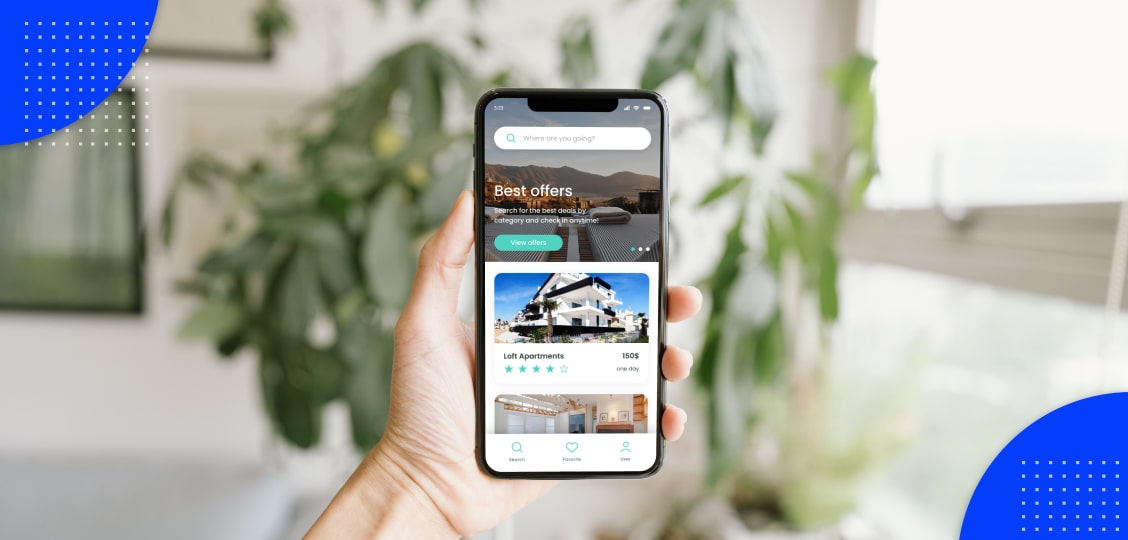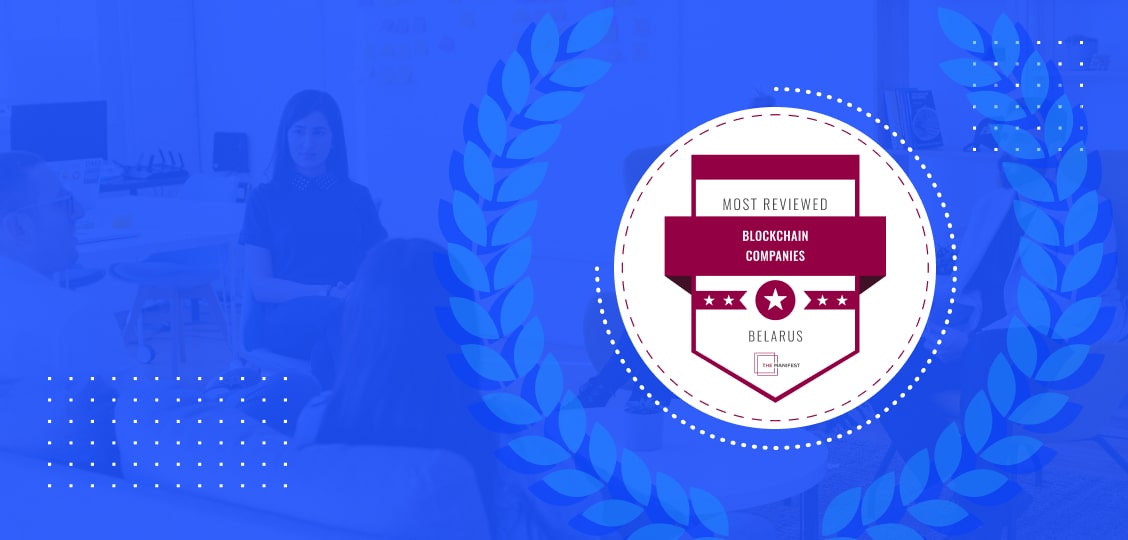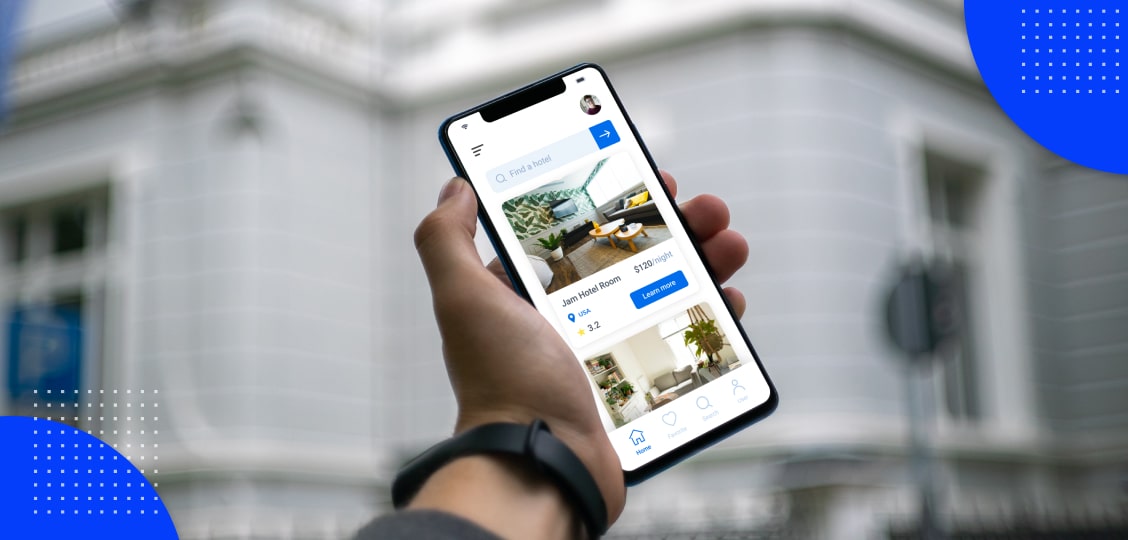Arateg is named as Belarus’ most reviewed blockchain developer
Congratulations and many thanks to our team and clients! We’re among the best blockchain developers in Belarus by The Manifest’s new award.

When aiming to make a website like Airbnb and generate revenue, it is crucial to plan out a budget and estimate the timeline necessary to launch a product. In addition, an organization needs to research competitors to discover their strong and weak sides.
To create a quality solution and achieve success, you should partner with a trustworthy marketplace development company that will provide assistance in prioritizing features and choosing a technology stack.
This article considers how to build a platform like Airbnb, including project cost and implementation time. Our software experts have also described the story of the Airbnb online lodging marketplace to identify the winning formula. Let’s get started.
Experts at SWEOR report that 88% of customers will not revisit a website after receiving a poor experience. According to WebFX, design has a 75% impact on the audience’s credibility to the web solution. Therefore, it is important to focus on this stage of building a website like Airbnb.
When making an online lodging marketplace, it is essential to:
Develop a unique branding theme. If you want to make a website like Airbnb while gaining a competitive advantage, you should develop a unique branding style that meets user preferences.
However, when using a market-ready template, there is a risk to meet a clone of an online lodging marketplace. Furthermore, it may be challenging to optimize a website for search engines in this case. To deliver the best user experience while preventing these issues, we recommend that you create a custom UI/UX design.
Time: 200 hours
To learn more about building a superior product, explore the top 7 principles of a quality software design described by Andrew Volchek, CEO and Co-founder at Arateg, who has in-depth expertise in UI/UX design.
A vacation rental marketplace has to enable customers to sign up/in for creating a user profile and booking accommodations. When building a website like Airbnb, it is crucial to provide various methods to sign in/up, for instance, via an email, phone number, Google, and social media accounts such as Facebook, Instagram, Twitter.
For the purpose of improving user satisfaction and preventing churn, do not force travelers to register when travelers visit a marketplace platform for the first time. Signing up should be obligatory to make a reservation but not earlier.
Time: 40-80 hours
A user profile is a key feature of an online lodging marketplace. The profile usually contains information such as name, surname, age, location.
To build a website like Airbnb, you need to use a peer-to-peer model, this way allowing travelers to act as hosts renting out properties and inversely. Thanks to this, it will be easier to attract and engage the audience.
Time: 80 hours
When creating a platform like Airbnb, it is important to enable search across a catalog using a variety of filters, for example, location, arrival/departure date, the number of guests and rooms, property type, price, basic and additional facilities, as well as languages known by hosts.
You should also enable users to search for accommodations by house rules such as “pets allowed” and “smoking allowed”.
Time: 100-120 hours
An online lodging marketplace has to provide property descriptions to facilitate search while helping vendors attract travelers. The page generally contains information such as overview, address, price, photos, amenities, as well as host’s name and contacts.
For the purpose of boosting customer loyalty, you can display customer reviews and the overall rating score on the page. When building a website like Airbnb, it is reasonable to let users set up the arrival and departure dates for checking out reservation availability. Furthermore, consumers should be able to view the property on the map.
Time: 100 hours
By adding this feature to a vacation rental marketplace, you will increase user credibility in rendered services. To prevent fake testimonials, it is crucial to allow only registered customers who have actually stayed in accommodation to leave their comments and score services.
With reviews and ratings, travelers will be able to estimate the quality of rendered services and make more informed booking decisions. Hosts, in their turn, will have the opportunity to find out what attracts their customers and what pushes them aside.
Time: 120 hours
Geolocation is another key feature of a vacation rental marketplace that serves for identifying user location. Thanks to this, a software platform like Airbnb can create personalized offers, for instance, showcasing accommodations situated near customers.
Time: 120 hours
Search by moving the map is a valuable feature that allows users to seek accommodations in certain locations using zoom in/out. Thanks to this, travelers will be able to view sightseeing attractions, cafes, restaurants nearby.
When building a website like Airbnb, online marketplace developers can provide the possibility to look through property previews and make reservations with a few clicks. As a result, you will improve customer engagement and increase the conversion rate.
For this purpose, software engineers can integrate an application programming interface (API), for example, Google Maps or Google Places. Using an API, the team will not have to implement this functionality from scratch, this way saving you time and costs.
Check out third-party services —for inventory tracking, order management, data analytics, digital payment, and more—that you can integrate into an online lodging marketplace.
Time: 60 hours
Accommodation booking is an essential feature of a marketplace platform like Airbnb. When creating a marketplace website, software developers have to enable reservation by property type, arrival and departure dates, the number of guests and rooms, amenities, price, and other characteristics.
Time: 160 hours
According to Invesp, 11% of customers abandon their shopping carts due to a complex checkout process while 7% of users say they are not willing to make a purchase when the system does not offer enough payment options.
To prevent these issues, a marketplace development team can integrate a payment gateway acting as an analog of a third-party virtual terminal. With a gateway solution, you will allow for carrying out transactions via a range of methods.
For instance, Braintree enables users to make money transfers using credit and debit cards, digital wallets, ACH Direct, as well as online banking services (e.g., Trustly, SOFORT, GiroPay). What’s more, payment gateways include features such as 3D Secure, CVV (card verification code check), and AVS (Address Verification System) to enforce security.
Popular gateway systems often take complementary measures to safeguard sensitive data. PayPal, for example, utilizes artificial intelligence to instantaneously identify suspicious activities and protect against fraud.
Time: 120 hours
During registration on a vacation rental marketplace, vendors fill out information like name, address, contacts, property category, and available payment options. Hosts should also provide accommodation descriptions, and upload photos.
Time: 80 hours
When thinking about how to make a website like Airbnb, it is important to focus on the business-specific needs of vendors. With this aim in view, property management has to be enabled. Therefore, you should let hosts publish, edit, and remove their offering, indicate prices and room availability, describe facilities, as well as upload photos.
Time: 100 hours
An online lodging marketplace has to allow travelers to book accommodations for certain dates. Property owners, in their turn, should have the possibility to confirm or decline reservation requests. It is also important to enable hosts to track booking status, for instance, in review, paid, or canceled.
Time: 200 hours
Messaging is another essential feature that you should deliver when building an online lodging marketplace. By introducing private chats, you will let customers discuss with vendors trip details such as arrival time, the number of guests, price, delays.
Time: 200 hours
During online marketplace development, it is crucial to deliver a notification system to instantly alert hosts about booking requests, reviews, incoming messages, and other issues. When building this feature, software engineers can set up email, browser, in-app, and/or smartphone notifications.
If you are wondering how to build a website like Airbnb, it is important to create an administrator panel, vital to listing management, booking history viewing, and financial issue handling.
Serving as a separate web application, an admin panel can allow for managing listings, verifying user identities, and monitoring the audience’s feedback. To safeguard sensitive information, software experts can deliver role-based data access control.
What’s more, marketplace owners should be able to analyze user data such as the number of website visitors, unique sessions, and bounce rate, for example, with the help of Google Analytics or Mixpanel.
Time: 2000–2500 hours
The price of building an online lodging marketplace like Airbnb depends on the time required for delivery, as well as software expert salaries that may significantly differ from country to country. For example, US and UK software engineering firms generally charge $50–$150 per hour while IT service providers in Western Europe ask for $40–$100.
By comparison, the hourly rates of software development companies in Belarus are $20-$50 for the same skills and knowledge. Let’s consider an indicative budget that you should have for marketplace creation.
The cost of making a website like Airbnb:
This way, project outsourcing to Belarus can allow you to reduce costs by 2.5–3 times while end-product quality will be the same or higher. Find out how Arateg establishes effective cooperation with clients by ensuring process transparency and data confidentiality. Founded in 2014, Arateg is a trustworthy, reward-winning provider of marketplace development services located in Belarus.
The choice of the technology stack for building a website like Airbnb is essential to prevent issues such as downtime, poor performance, and security risks. By employing cutting-edge technologies, it is possible to achieve scalability, high availability, and resilience. Thanks to this, an online marketplace platform will be able to maintain a rapidly growing number of users and handle heavy loads. What’s more, engineers can reduce the feature release cycle.
For example, Python comes up with a multitude of libraries, frameworks, and functionality packages allowing teams to implement features such as data analytics and system administration much faster. With Amazon Web Services (AWS), programmers can set up autoscaling of resources and facilitate infrastructure maintenance.
To create an online lodging marketplace like Airbnb, software experts can employ the following technology stack:
Software engineers can integrate a vacation rental marketplace with a range of application programming interfaces (APIs) for:
See the list of third-party APIs you can integrate a platform like Airbnb with.
The idea of Airbnb came up in 2007 when designers Brian Chesky and Joe Gebbia could not afford their San Francisco rent. As a major design conference was to take place, it was difficult to book hotel rooms. This way, Gebbia recognized the opportunity of converting a loft into a bed and breakfast service to earn profit while enabling people to rent places and save money.
In 2008, Nathan Blecharczyk, a technical architect, joined the team. Aiming to test the idea in action and validate its feasibility, the founders built a minimum viable product (MVP)—a simple website airbedandbreakfast.com—in the course of a few weeks. They also purchased three air mattresses and arranged them in their loft.
By summer 2008, a final version of the website was completed. Focusing on intuitiveness, the guys redesigned the whole experience, making it possible to book accommodations in just three clicks. Soon the startup managed to enter into the Y Combinator's seed capital program and raise $20,000 in venture funding.
Then, the owners decided to promote the product by developing relationships with consumers. For this purpose, Brian, Joe, and Nathan went to New York to support vendors by taking and uploading photos of properties for their demonstration on the platform. This helped form a loyal group of customers and grow the client base. By the end of February 2009, a vacation rental marketplace served 10,000 users and contained 2,500 listings.
In March 2009, the offering was extended from beds and spaces to a variety of properties, including houses, private rooms, and boats. Next month, Airbnb attracted $600,000 from Sequoia Capital. In 2010, the startup raised $7.2 million in Series A.
With the view of improving user experience, Airbnb introduced "Neighborhoods", a travel guide of 23 cities that assists tourists in choosing a place to stay based on personal preferences and other criteria. In 2014, the team made changes to the design of the website and mobile app.
In 2015, the organization released an iPad application and entered into a partnership with Deutsche Telekom to have its mobile app pre-installed in 13 countries. That same year, Airbnb delivered a pricing recommendation tool to show the best prices to customers searching for properties on a multi-vendor marketplace.
Learn more about the MVP development approach and the advantages it offers.
Use all opportunities to reach the audience. To attract as many customers as possible, you should reach them via all devices. For this purpose, you can build a simple website like Airbnb, then implement new features, and finally — release a mobile application.
You should also consider the possibility of making a progressive web app (PWA) instead of a mobile solution to allow users to install a website on their smartphones. As it is faster and easier in comparison with mobile marketplace app development, you will save time and costs. Explore the top six benefits of PWAs.
Established in 2014, Arateg assists startups and SMEs in addressing business challenges and adding value to customers. Based in Eastern Europe, Arateg is a trusted provider of online marketplace development services that makes software solutions aligning with end-user needs and preferences.
With the view of delivering a seamless user experience, our engineers apply advanced technologies and best practices to ensure scalability, high availability, fault tolerance, and security. Furthermore, we manage to automate testing and deployment, this way reducing the feature release time.
To help you achieve success and generate revenue, our software experts are ready to help you conduct competitor analysis, prioritize features, and outline an implementation roadmap. Our developers also choose a technology stack that perfectly meets project requirements.
By now, we have built dozens of marketplace websites and apps. For instance, recently our team has created a vacation rental marketplace for booking accommodations in Germany for a long or short lease. Here you can see our featured case studies.
If you aim to make a website like Airbnb, you are welcome to drop us a message. We will get back to you within 1 business day and help address all challenges. Project consultation is free of charge.

Congratulations and many thanks to our team and clients! We’re among the best blockchain developers in Belarus by The Manifest’s new award.

How much does it cost to make a marketplace website like Booking.com? How much time does it take? What features do you need to implement? We’ve got the answers.
Now, you will receive a fresh newsletter from us.
Get the latest scoop on software application tips, announcements, and updates from us. Subscribe to our newsletter!